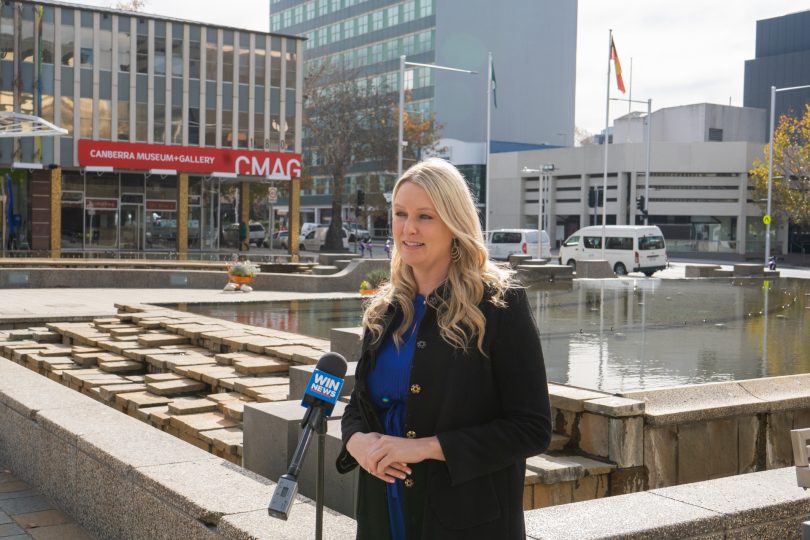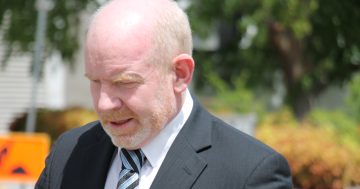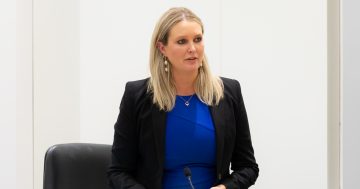
Consent law reforms in the ACT aim to give more power to victim-survivors. Photo: Michelle Kroll.
New consent laws in the ACT will make it easier for victim-survivors of sexual assault to prove they did not consent under a reform package that implements a positive definition of consent.
This means a person must actively communicate consent instead of not resisting or saying no, and it can be either verbal or non-verbal.
The reforms aim to address instances where victims of sexual assault may not actively resist or say no due to fear or experience a ‘freeze’ reaction.
Labor backbencher Dr Marisa Paterson, who released the exposure draft on Monday (21 June), said the new reforms would remove the inference that sexual assault is a violent act to a much more nuanced approach.
It will bring the ACT’s laws in line with contemporary community expectations, Dr Paterson said.
“This is a significant step forward for our community and I hope it is seen as an empowering moment for all those survivors of sexual violence in our community,” she said.

Dr Marisa Paterson has released an exposure draft for her proposed law reform around the definition of consent. Photo: Dominic Giannini.
“The bill introduces a common sense, human decency approach to respectful relationships,” she wrote in an FAQ for the bill.
“This is not about a contract or an overly prescriptive approach, but one which focuses on decent, respectful human relationships.”
The reforms explicitly outline that consent is ongoing, can be withdrawn at any time and is not given just because a person “does not say or do something to resist the act”.
Consent is also withdrawn if the person falls asleep or is rendered unconscious during the sexual activity.
The word ‘threat’ will be replaced by the term ‘overborne’ in some instances to help clarify the definition of sexual assault. Overborne will cover emotional pressure as well as physical force.
The bill amends wording in the Crimes Act to include a broader set of circumstances where a person is deemed to be overborne by the abuse of a relationship of authority, trust or dependence, or a professional relationship.
“This includes situations whereby a person may participate in a sexual act because they believe it might help progress their career or other prospects; or because they believe not participating in the sexual act might hinder their career or other prospects,” the bill’s explanatory statement says.
The laws in the Territory have drawn on NSW’s sexual consent reform package, as well as the NSW Law Reform Commission’s report from November last year.
A push for positive consent laws was partially based on the Luke Lazarus trial in NSW after a judge-only retrial found him not guilty of his original conviction, sexual intercourse without consent.
The decision was based on the judge accepting that Mr Lazarus “had a genuine and honest belief that the complainant was consenting to intercourse”.
Dr Paterson’s bill also incorporated recommendations from a similar bill proposed by then-Greens MLA Caroline Le Couteur in 2018.
Ms Le Couteur’s bill proved contentious as it outlined that a perpetrator would have to prove they knew the person was consenting and raised questions about switching the onus of proof.
The presumption of innocence will remain, but if the reforms pass, an accused person will need to prove they tried to ascertain consent in the circumstances with the legislation stating that consent cannot be presumed.
The burden of proof remains with the prosecution for all elements of a sexual offence under the bill and the prosecution will need to prove that an accused person’s belief that consent was not reasonable in the circumstances.
The proposed legislation does not explicitly criminalise the practice of stealthing – the non-consensual removal of a condom during sex – which was a key recommendation of the NSW Law Reform Commission’s report.
Changes to the section about dishonestly procuring sex under a false pretence “may” include stealthing, the explanatory statement says.
Opposition Leader Elizabeth Lee introduced a bill in April to explicitly criminalise stealthing and remove any doubt around the legal grey area.
Attorney-General Shane Rattenbury previously said that while it was the government’s view that stealthing was already illegal with consent being negated if obtained by fraud, there may be value in putting the offence beyond doubt.
An exposure draft of Dr Paterson’s bill is available for public comment until 5:00 pm on Friday, 16 July and can be accessed here.
If this story has brought up any issues, you can contact the Canberra Rape Crisis Centre’s support line on 6247 2525 between 7:00 am and 11:00 pm for all counselling-related inquiries, including all appointments and referrals.
1800RESPECT, the national sexual assault, domestic and family violence counselling service, can be contacted 24 hours a day, seven days a week on 1800 737 732.




















